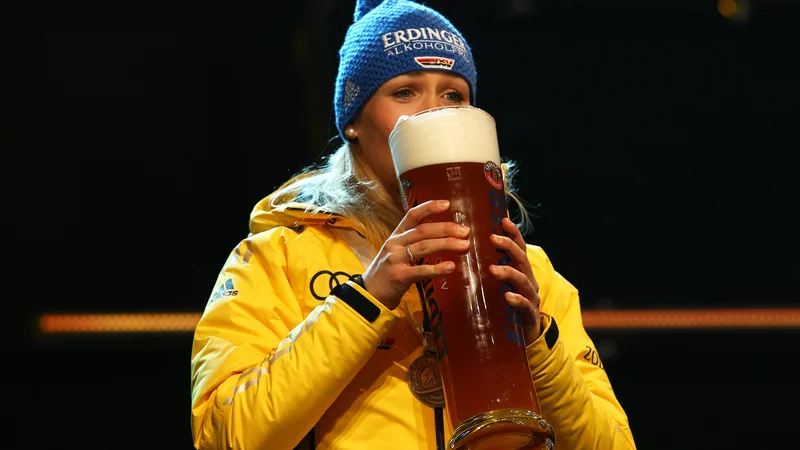The 0.5% question: Is Non-Alcoholic Beer Good For you?
/Contributor Liam Ford delves into the world of non-alcoholic beers and the health impact of ‘near beers’
Magdalena Neuner of Germany enjoys a glass of Erdinger nonalcoholic beer after a medal ceremony at the biathlon world championships in Ruhpolding, Germany, in 2012. Alexander Hassenstein/Bongarts/Getty Images
There’s a big buzz about non-alcoholic beer.
With new breweries that are focusing only on products with no alcohol, established breweries that have launched entire lines, and neighbourhood breweries that are crafting small batches of it, non-alcoholic beer is everywhere.
I'm a big fan ⏤ heck, I'm a cheerleader ⏤ and I know they're trendy. But are they healthy?
My gut says yes ⏤ relatively, at least.
Alcohol is a carcinogen; consuming less can only be a good thing, right?
Non-alcoholic beers list ingredients and nutrients ⏤ including the all-important calorie count ⏤ right on the label. So we know exactly what we're putting into our bodies, don't we?
I know that I'm no expert, so I found some people who are.
Adam Sherk is a scientist at The Canadian Institute for Substance Use Research at the University of Victoria in B.C., which has been researching alcohol's effects on public health for a long time.
Sherk also served on the panel of experts that contributed to the federal government's latest guidelines on alcohol consumption.
Sherk wanted to be clear that his research is in alcohol and public health, not in nutrition. But he agreed that non-alcoholic (NA) beer is relatively healthier.
"NA beer is, on average, healthier than beer with alcohol," he said. "An NA beer may contain some alcohol, but this is a very low dose. You would have to drink 10 of these to have the alcohol equivalent of one 5% beer."
Ten non-alcoholic beers? In one session? No thanks.
As for calories, Sherk said a little labelling goes a long way. Many non-alcoholic beers have 50% less calories than their alcoholic counterparts, which is always clear on the label.
"At least we can tell how many calories are in an NA beer, since the beverage is required to have a Nutrition Facts label. Alcoholic beverages are exempt, for some reason, from this."
The average Canadian consumes more than one-tenth of their daily energy needs in the form of alcohol with beer as the main culprit, according to an article Sherk co-wrote called Calorie Intake from Alcohol in Canada: Why New Labelling Requirements are Necessary.
“At least we can tell how many calories are in an NA beer, since the beverage is required to have a Nutrition Facts label.”
Alcohol doesn't replace calories from other sources, the article said, but adds to it. I've eaten enough McDonald's after last call in my life to know that's true. And the result?
"Research has suggested that alcohol consumption may contribute substantially to rising youth and adult obesity rates," the article said.
So more alcohol may equal more obesity. Which means less alcohol would equal less obesity. Seems obvious enough.
Despite this, Sherk ⏤ a public-health researcher, not a nutritionist ⏤ was noncommittal.
"I couldn't go as far as saying that all NA beer is healthy," he said. "It would really depend on each brand, the ingredients used and the breakdown of nutrients provided in the NA beer."
So I decided to talk to someone who wrote the book on nutrition ⏤ well, a book, anyway.
Diana Bedoya is a senior lecturer in the Department of Biomedical Physiology and Kinesiology at Simon Fraser University in Burnaby, B.C. She’s also the author of the Essential Nutrition textbook.
Bedoya considered the question from three different perspectives: physical, mental, and social.
Beer ⏤ alcoholic or not ⏤ contains a lot of polyphenols, Bedoya said, which are compounds found in plants that have antioxidant effects.
“Beer also contains kaempferol, quercetin, tyrosol, and phenolic acids, other “potentially protective compounds.”
“Diets rich in polyphenols have been associated with a lower risk of chronic diseases such as cancer and heart disease,” she said. “Since high consumption of the ethanol found in alcoholic beer is known to promote these chronic diseases, it stands to reason that consuming non-alcoholic beer may promote health in this area.”
Beer also contains kaempferol, quercetin, tyrosol, and phenolic acids, other “potentially protective compounds.”
Several studies have looked at the impacts of non-alcoholic beer as a pre- or post-workout drink for athletes, and as recently as 2018, non-alcoholic beer made NYT headlines when the German Olympic team shared they were serious fans of n/a beer while training.
As for calories, Bedoya corroborates Sherk’s findings.
“If someone regularly consumes an amount of beer, alcoholic or non-alcoholic, that puts them above their energy requirements for the day,” she said, “over time that may increase the risk of storing extra fat on the body, potentially increasing the risk of obesity.”
From a mental standpoint, non-alcoholic beer doesn’t carry the same risk of addiction, which makes it “a better option for someone who might be at higher risk of an alcohol dependency.”
Which leaves the social aspect.
“If you have friends who drink beer,” Bedoya said, “non-alcoholic beer might help a person with an alcohol-free lifestyle to still feel included and able to enjoy social activities with people that drink alcoholic beer.”
Anecdotally speaking, I agree.
Unfortunately, few studies have focused only on non-alcoholic beer, so the jury’s still out on its overall health benefits.
So what are we alcohol-free beer aficionados to take away from this?
For me, a reminder that consuming less alcohol and fewer calories can only be a good thing ⏤ for our health, for our families, friends, and communities, and for our neglected health-care system.
I’d say that's worth raising a glass of non-alcoholic beer to.
Oh, and always check the label.
Liam Ford, Contributor
Liam is a poet, writer, and editor with a decade of experience as a bartender under his belt. His mission? To find an alcohol-free craft beer that satisfies his craving for hops.




